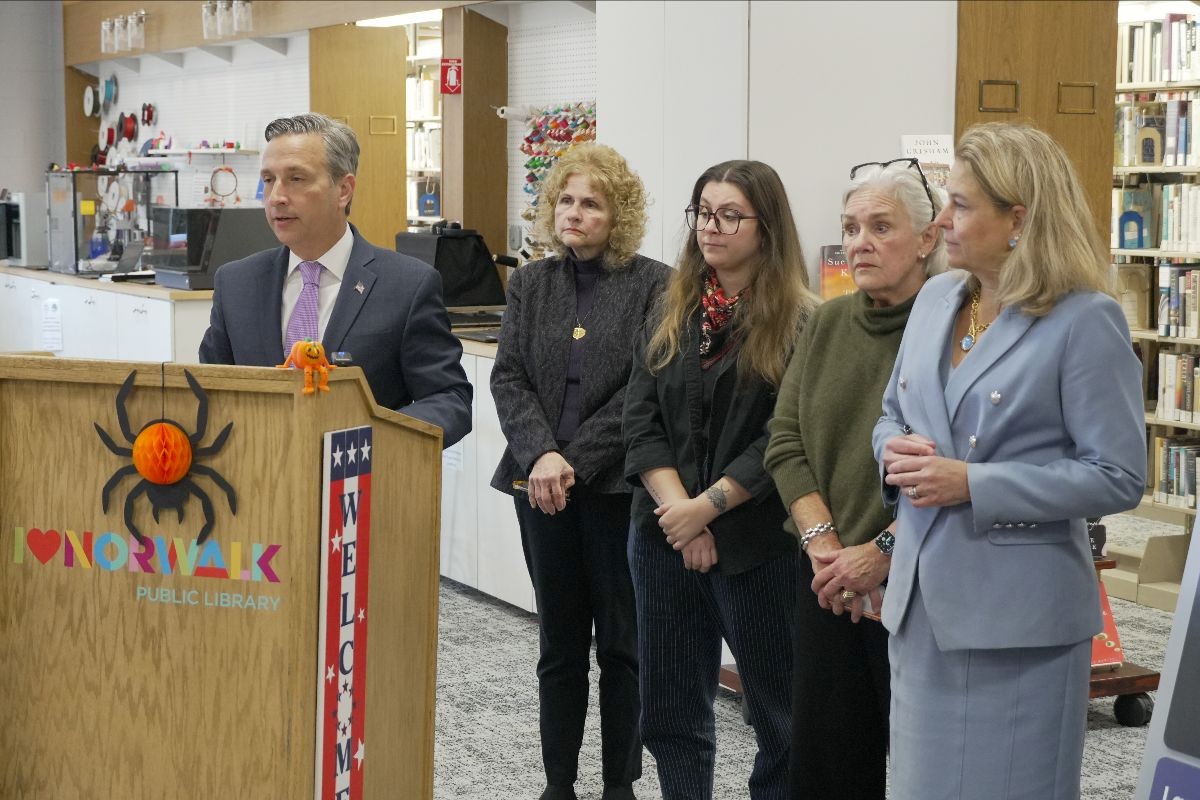DURING BANNED BOOKS WEEK, SENATORS DUFF, MAHER, REP. DATHAN PROMOTE CONNECTICUT’S PROTECTION OF SCHOOL, PUBLIC LIBRARIES
From left, Sen. Duff speaks as Cunningham, Pentheny, Sen. Maher and Rep. Dathan look on Thursday afternoon in Norwalk.
With libraries across the country recognizing Banned Books Week and growing national efforts to censor and limit the availability of works of literature, Senate Majority Leader Bob Duff (D-Norwalk) and State Senator Ceci Maher (D-Wilton) and State Representative Lucy Dathan (D-New Canaan, Norwalk) today visited Norwalk Public Library to promote new laws in Connecticut protecting books in school and public libraries across the state.
As part of the 2025-26 state budget, Connecticut public and school libraries are now required to adopt policies regarding the selection and presentation of materials in their libraries, as well as policies regarding how library staff reviews challenges to books. By having these policies in place, libraries statewide will have a standard – which different libraries can customize to their needs – to review questioned content and make detailed, thorough decisions regarding those books’ content and public access to them.
Sen. Duff, Sen. Maher and Rep. Dathan were joined by Triangle Community Center community education director Cadence Pentheny and Norwalk Public Library children’s librarian Evelyn Cunningham.
“On a national basis, book bans and challenges have tripled in the last five years, and we’ve seen more than a hundred in our state. Let’s be clear about what we’re talking about: we’re talking about librarians being harassed on the job and attempts to get books pulled from shelves because one person decides an entire community cannot handle its content. In some cases, books have been challenged that had never even been checked out of libraries,” said Sen. Duff. “Connecticut’s new policies will still allow for challenges based on books’ content; they simply ensure every library in the state has a proper procedure to review those challenges and better serve their communities.”
“Public libraries serve entire towns and communities, while school libraries are meant to foster and encourage young minds to learn and grow. This law seeks to preserve that,” said Sen. Maher. “In states where culture wars and book bans have run wild like Florida, some schools have stripped their libraries of hundreds of books like “The Diary of Anne Frank” and “I Know Why The Caged Bird Sings,” as well as George Takei’s graphic novel, “They Called Us Enemy,” about his experience incarcerated as a child in an American concentration camp for people of Japanese heritage during World War II. This law keeps books on library shelves and makes sure that if someone challenges a book’s content, that challenge will be taken seriously and reviewed according to the library’s governance documents. What this legislation prevents are efforts to unilaterally strip literature from shelves.”
“I’m grateful to my colleagues for taking up this initiative. Some people see it as controversial; I see it as a First Amendment right,” said Rep. Dathan. “We are limiting, in effect, what people can say and speak in a public environment. We need to ensure everyone in our community, no matter who they are, can be exposed to many forms of literature. That’s how we become more engaged adults in society and how we better hear all ideas. I get disheartened when I hear from librarians in my communities who tell me they’re receiving threats. We need to make sure all of our children are exposed to different ideas as understanding different ideas and points of view is part of growing up.”
The new law was introduced to ensure Connecticut libraries and their staff can do their jobs and support educational connections in their communities. It provides immunity for librarians performing regular work duties and allows librarians legal action if they suffer defamation or reputational damage in doing their duties.
The press conference came during Banned Books Week, and the American Library Association reported that the number of book challenges in the United States has increased nearly 10 times from 2001-2020 to 2024, with the total annual average rising from 273 to 2,452. About 93% of all book challenges take place at school and public libraries; the ALA found that organizations and government entities represented 72% of all censorship demands, with the 120 most-targeted books in its rankings all appearing on partisan political websites.
PEN America noted that national groups such as Moms for Liberty and US Parents Involved in Education are increasing their calls for book censorship and that just 4% of book bans in 2021-22, a recently tracked year, followed recommended steps after challenges were made; more than 2,500 books were removed under pressure against school or public library staff.
Share this page:

